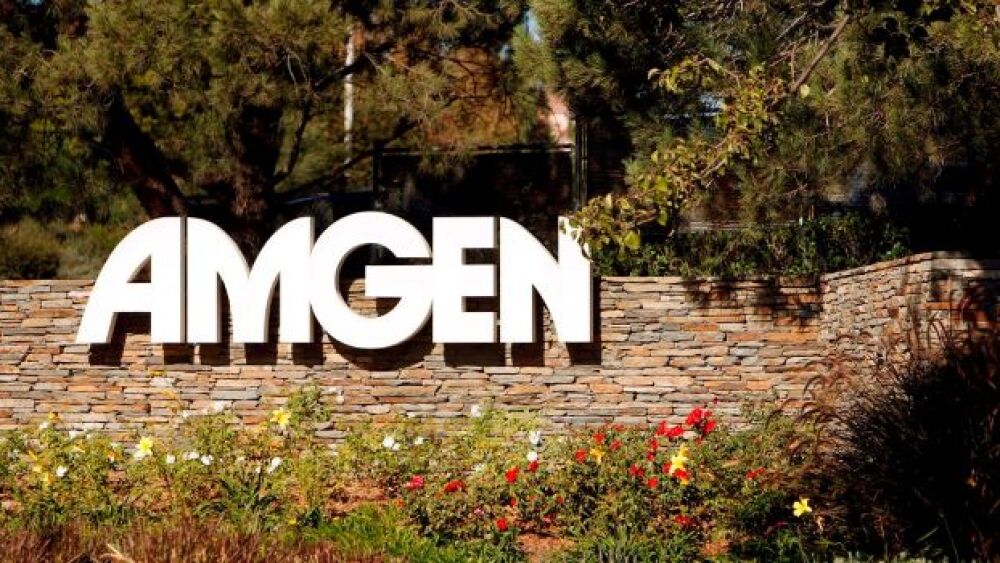Four months after collaborating on an experimental atopic dermatitis treatment, Amgen and Kyowa Kirin are seeing the fruits of that deal with positive Phase II data.
Al Seib / Los Angeles Times via Getty Images
Four months after forging a collaboration to develop an experimental atopic dermatitis treatment, Amgen and Japan’s Kyowa Kirin are beginning to see the fruits of that deal with positive Phase II data for AMG 451/KHK4083, a potential first-in-class anti-OX40 monoclonal antibody.
At a presentation at the 30th Annual European Academy of Dermatology and Venereology (EADV) Congress, Amgen and Kyowa Kirin showed that AMG 451/KHK4083 demonstrated statistically greater improvements from baseline in the Eczema Area and Severity Index (EASI) score at 16 weeks compared to placebo, the primary endpoint of the study. The experimental medication was given to those patients with chronic, recurrent, moderate-to-severe atopic dermatitis. Additionally, patients who received AMG 451/KHK4083 saw progressive improvement in efficacy following the 16-week mark. AMG 451/KHK4083 is being developed as a potential treatment for adult patients with moderate-to-severe atopic dermatitis.
In the Phase II study, patients who received AMG 451/KHK4083 were randomized to receive one of four dosing levels. According to the companies in the announcement, each dosing level generated positive results compared to placebo. Patients who received a 600 mg dose every two weeks saw a 57.4% improvement in their atopic dermatitis compared to placebo patients. Patients who received the same dose every four weeks saw a 49.7% improvement. Those who received 300 mg every two weeks saw a 61.1% improvement, and patients who received 150 mg every four weeks saw a 48.3% improvement compared to placebo.
The study also hit key secondary endpoints, including achieving a 75% reduction from the baseline in EASI score.
AMG 451/KHK4083 targets and inhibits the activity of the OX40 receptor, which is expressed on the surface of activated effector T-cells, and has been shown to enhance the depletion of activated OX40+ T-cells by ADCC. The companies noted that T-cells expressing OX40 are present in the lesions of patients with atopic dermatitis and are critical in the disease pathophysiology.
Yoshifumi Torii, head of the research and development division of Kyowa Kirin, said the results of the Phase II study demonstrate that inhibition and deletion of the OX40-expressing cells could be an important and new approach to treating moderate-to-severe atopic dermatitis.
Dr. David M. Reese, executive vice president of Research and Development at Amgen, said the data from the Phase II study offers strong evidence for AMG 451/KHK4083 as a potential treatment for patients with atopic dermatitis, which impacts nearly 30 million people across the globe. Reese said the two companies anticipate initiating a Phase III study of this atopic dermatitis asset in the first half of 2022.
Amgen and Kyowa Kirin successfully partnered in the 1980s to develop the anemia treatment Epogen. That drug was the first Amgen medication to win regulatory approval in the United States. In addition to Epogen, Amgen and Kyowa Kirin have collaborated on the development of other drugs to win approval from the U.S. Food and Drug Administration (FDA), including Neupogen, Neulasta and Nplate.
Under terms of the most recent collaboration, Kyowa Kirin will retain commercial rights to AMG 451/KHK4083 in Japan. If approved, the companies will co-promote the asset in the United States and Kyowa Kirin has opt-in rights to co-promote in certain other markets including Europe and Asia.
Featured Jobs on BioSpace





